The bittersweet experience of Adab festival without Asif Farrukhi
Centring climate change, the fourth edition of the literary festival took place from Nov 26-27 at Frere Hall, Karachi
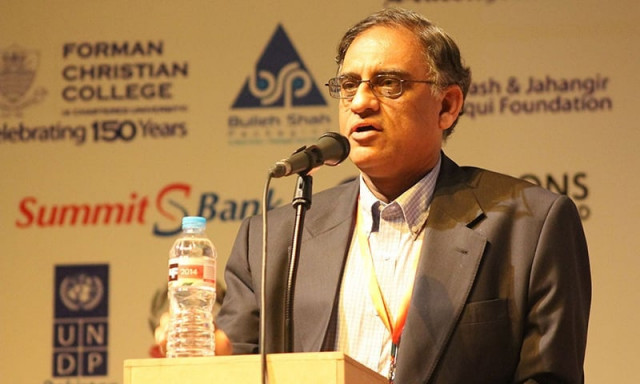
The fourth edition of Adab Festival was a rather personal and emotionally challenging experience for co-founder Ameena Saiyid and her team. Not only because the festival opened its doors to a live audience after a gap of three years but also because it was the first instalment without, founder Asif Farrukhi.
Ode to the mentor
Following Farrukhi's demise, Saiyid brought in Shama Askari, a student of his, as project director. Theatre artist by profession, Askari met Farrukhi at the beginning of Tlism Festival in 2005 and since then she had participated in several of Farrukhi's ventures.
“Through dramatic readings or dance performances, I had always been a part of Adab Festival since its onset in 2019, except for 2021 when I fractured my foot. So when Ameena jee asked me to join the festival as an organiser, a director, and a contributor, I was overwhelmed. Of course, I said yes. It was a debt I owed to Asif Sahab – a debt of gratitude,” a heavy-hearted Askari told The Express Tribune in a telephonic conversation.
Askari went on to reminisce how hard it was for her to process Farrukhi’s death, especially since her work felt like hanging without support, all of a sudden. Hiroshima and Other Stories by Ibn-e-Sa’id, a short story collection in Urdu, was translated by Askari under Farrukhi’s supervision. The book was launched at the Adab Festival this year.
“We were so close. We came such a long way, it feels unreal that the book is finally published. It was more of a closure for me you know, the book launch,” she said with a pause. “I lost him in the project mid-way. Nobody was there to supervise my work, to see if I'm doing the right things. All my contacts, Aamer Hussain, Zubeda Mustafa, and Ameena, were all through Asif Sahab. It really was a closure for me.”
When Askari found a publisher for her book she immediately called Farrukhi. He promised to write a foreword for it. 12 days later, he passed away. The foreword, and some of his translations, still exist in the book; with permission from his daughter Ghazal Farrukhi.
Due to time constraints, Askari’s book launch at Adab Festival had to be shortened. “As an organiser, the adrenaline and the panic levels are generally so high that you don’t realise how quickly the event passes. I can only remember so much I could’ve said during the speech, so much I could’ve read as excerpts from the book. It was overwhelming, humbling and a blessing to be honest. As I said, it was a debt of gratitude.”
Askari recalled her son, who was present in the audience, pointed out that he could feel a quiver in her voice towards the end of her reading. “That’s how emotional the experience was,” she said.
An ode to ecology
Adab Festival, this year-round focused on climate change. This year’s objective was to highlight domestic and international literature focusing on the destruction caused by environmental catastrophes. “Climate change is the biggest dialogue happening in the world and it is of prime importance that we engage in it, particularly with the youth. The festival gave us a space to speak about the impact it has had, on women in particular and of course on their mental well-being. People have been displaced. We have to protect Karachi and there was so much inspiration to take throughout the event,” Askari elaborated.
“We chose Frere Hall as a venue because we wanted to reclaim public spaces. I think most people saw the interior of Frere Hall for the first time and its library, especially the masses.” She then spoke about the two main aims of the festival this year, inclusivity and representation. “We hope to bring equality and narrow the socio-economic gap, and make Adab accessible to all. That is why this festival is free and open to all.”
When asked which segment was her personal favourite, Askari took a long pause. “It’s a difficult question but if I have to pick a favourite, there are two,” she exclaimed.
“The first one was titled 'Karachi Ka Adab.' You know how Karachi is the ultimate melting point of all cultures and languages, so we decided to bring authors, scholars and linguistic specialists to bring adab from their language and cultures to the table. Taha Kehar (English), Syed Kashif (Urdu), Attiya Dawood (Sindhi), and Zahida Raees (Balochi) came together and had the most wholesome session. We really wanted to bring in Memoni, Gujarati and other languages as well but we didn't have enough time.”
The second favourite was ‘Contagious Connectivity’. The session saw Dr Samina Zahir, FRSA from the UK, and Naila Mahmood, discussing art, the pandemic and their correlation in creating comfort. It essentially explored how Covid actually made artists globally connect and create.
About the future of the Adab Festival without one of its founders, Askari called the annual event an ongoing creative process. “All creative work is dynamic and organic, it can not remain static. It might change shape in some of its outcomes, but as long as people continue showcasing their work, and taking pride in their own cultural identities, then yes, we’ll have a movement.”
Have something to add to the story? Share it in the comments below.

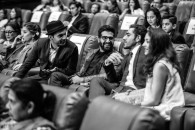
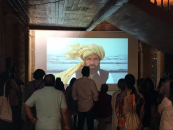
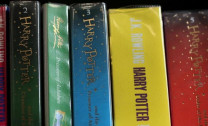


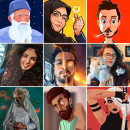












COMMENTS
Comments are moderated and generally will be posted if they are on-topic and not abusive.
For more information, please see our Comments FAQ